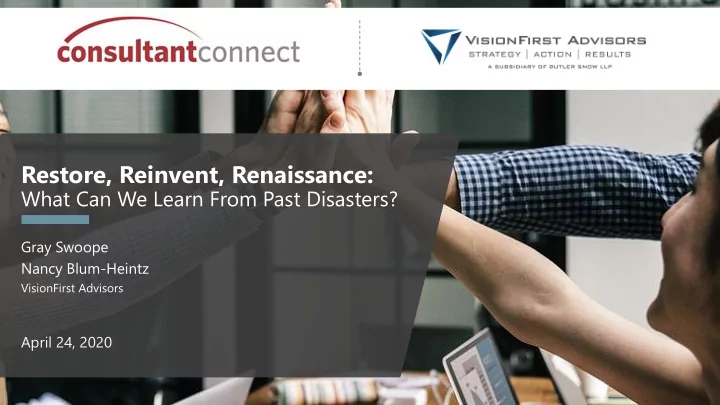

Oops. here us correct email: gray.swoope@visionfirstadvisors.com Thanks! Restore, Reinvent, Renaissance: What Can We Learn From Past Disasters? Gray Swoope Nancy Blum-Heintz VisionFirst Advisors April 24, 2020
Areas of Expertise Location Advisory & Site Selection • Asset Value Optimization • Stakeholder & Board Management • Business Recruitment, Retention & Expansion • Foreign Direct Investment & Trade • Strategic & Crisis Communications • Workforce & Demographic Research • Community Strategy • Public Records & Transparency Policies • Strategic Planning • Benchmarking & Best Practices • Collaborative Management • Graphic Design, Branding & Marketing • Research & Analysis • Community Campaign Strategy • GIS-Mapping & 3-D Modeling • Public Finance • Incentives Negotiation & Compliance • Public/Private Partnerships • Government Relations • Senior Consultant COLUMBUS, MISSISSIPPI
DISASTER RECOVERY Four components: • Restore (Days, Months, Years) • Resiliency • Renewal • Transformation
RESTORE ECONOMY When there is no economy you have to create it. • Delicate balance between health and economic issues • Federal resources • State led resources • Implemented locally • Set a vision • Communicate • Mission focused
RESILIENCY Dangers in just going back like • before Mitigate future risk • Public policy • Infrastructure •
RENEWAL & TRANSFORMATION Opportunity for perpetual • challenged communities Onshoring • Telehealth and telemedicine • Remote working • Catalyst projects •
WE ARE IN THE SAME STORM, NOT IN THE SAME BOAT • Total transparency • Be a trusted source for all audiences – not just media and not everyone but media • What are you doing? When are you doing it? Who are you doing it for? How much is it costing? • Address the rumors …quickly • Admit mistakes • Share the good news • Be consistent
6 PRINCIPLES OF EFFECTIVE CRISIS & RISK COMM 01 BE FIRST Crises are time-sensitive. Communicating information quickly is almost always important. For members of the public, the first source of information often becomes the preferred source. 02 BE RIGHT Accuracy establishes credibility. Information can include what is known, what is not known, and what is being done to fill in the gaps. 03 BE CREDIBLE Honesty and truthfulness should not be compromised during crises. CDC Crisis & Emergency Risk Communication Handbook CDC
6 PRINCIPLES OF EFFECTIVE CRISIS & RISK COMM 04 EXPRESS EMPATHY Crises create harm, and the suffering should be acknowledged in words. Addressing what people are feeling, and the challenges they face, builds trust and rapport. 05 PROMOTE ACTION Giving people meaningful things to do calms anxiety, helps restore order, and promotes a restored sense of control. 06 SHOW RESPECT Respectful communication is particularly important when people feel vulnerable. Respectful communication promotes cooperation and rapport. CDC Crisis & Emergency Risk Communication Handbook CDC
THANK YOU! Gray.Swoope@VisionFirstAdvisors.com Nancy.Heintz@VisionFirstAdvisors.com www.VisionFirstAdvisors.com
Recommend
More recommend